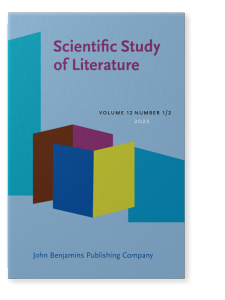Scientific Study of Literature
John Benjamins Publishing Company is no longer accepting SSOL submissions. Please submit your paper at ssol-journal.com.
Literature has an important role in human culture. Broadly interpreted, literature is defined as all cultural artefacts that make use of literary devices, such as narrativity, metaphoricity, symbolism. Its manifestations include novels, short stories, poetry, theatre, film, television, and, more recently, digital forms such as hypertext storytelling. Scientific Study of Literature (SSOL) publishes empirical studies that apply scientific stringency to cast light on the structure and function of literary phenomena. The journal welcomes contributions from many disciplinary perspectives (psychological, developmental, cross-cultural, cognitive, neuroscience, computational, and educational) to deepen our understanding of literature, literary processes, and literary applications.
Scientific Study of Literature (SSOL) is the official journal of IGEL (the International Society for the Empirical Study of Literature). IGEL membership includes a subscription to SSOL.
Latest articles
24 July 2023
3 July 2023
29 June 2023
13 June 2023
30 March 2023
28 March 2023
28 November 2022
25 November 2022
29 September 2022
20 June 2022
Issues
Online-first articlesVolume 12 (2022)
Volume 11 (2021)
Volume 10 (2020)
Volume 9 (2019)
Volume 8 (2018)
Volume 7 (2017)
Volume 6 (2016)
Volume 5 (2015)
Volume 4 (2014)
Volume 3 (2013)
Volume 2 (2012)
Volume 1 (2011)
Board
Subscription Info
General information about our electronic journals.
Subscription rates
All prices for print + online include postage/handling.
| Online-only | Print + online |
|---|
Available back-volumes
| Online-only | Print + online | ||
|---|---|---|---|
| Complete backset (Vols. 1‒12; 2011‒2022) |
24 issues; 3,600 pp. |
EUR 1,829.00 | EUR 2,035.00 |
| Volumes 10‒12 (2020‒2022) | 2 issues; avg. 300 pp. | EUR |
EUR |
| Volume 9 (2019) | 2 issues; 300 pp. | EUR |
EUR |
| Volume 8 (2018) | 2 issues; 300 pp. | EUR |
EUR |
| Volume 7 (2017) | 2 issues; 300 pp. | EUR |
EUR |
| Volume 6 (2016) | 2 issues; 300 pp. | EUR |
EUR |
| Volume 5 (2015) | 2 issues; 300 pp. | EUR |
EUR |
| Volume 4 (2014) | 2 issues; 300 pp. | EUR |
EUR |
| Volume 3 (2013) | 2 issues; 300 pp. | EUR |
EUR |
| Volumes 1‒2 (2011‒2012) | 2 issues; avg. 300 pp. | EUR |
EUR |
